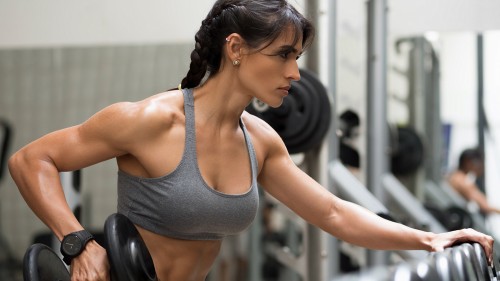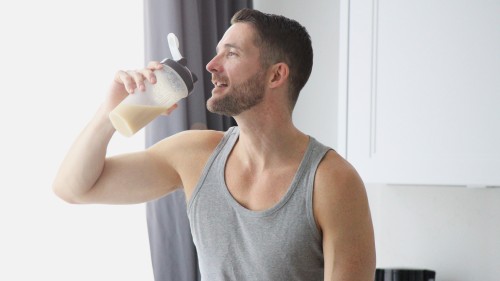10 Foods That Help You Build Muscle, According to a Dietitian
Published on March 25, 2022
Medically Reviewed by Natalie Olsen, MS, RDN
Weight training is what drives the muscle-building process, but foods provide the necessary fuel and building blocks to support this process. Here are 10 foods to add to your diet today to help you build muscle.


Food is incredibly powerful.
It helps bring people together, it can be used to treat or manage a variety of chronic health conditions, and it helps support healthy aging.
Food also provides the fuel and building blocks necessary to support athletic performance and fitness goals, like building muscle.
Here are 10 foods to add to your diet that help you build muscle.
1. Cow’s Milk
Milk contains two primary proteins, whey and casein.
Casein makes up about 80% of milk protein, while whey makes up the remaining 20%.
These proteins are easily digestible and contain essential and branched-chain amino acids that support muscle growth. (1)
One cup (240 mL) of milk provides 8 grams of protein and several vitamins and minerals, including vitamins A, B12, and D, choline, and calcium. (2)
Milk also makes a great post-workout recovery and rehydration drink. (3)
Lactose-free milk contains the same amount of protein as regular milk, making it a good option for people who are lactose intolerant.
The fat content level of the milk doesn’t make much of a difference, but you can save yourself extra calories by drinking skim or low-fat.
Put It Into Action
- Avoid flavored milks when possible due to their concentration of added sugars.
- Mix whey protein powder with milk for a protein boost.
- Use milk in replace of water when making smoothies for extra calories and protein.
2. Cottage Cheese
Cottage cheese is a fresh cheese with a creamy taste and smooth texture.
Because it’s manufactured from milk, the main protein in cottage cheese is casein.
Casein protein digests at a much slower rate than whey protein, making cottage cheese the perfect midday or nighttime snack.
Protein that digests at a slower rate helps decrease muscle protein breakdown and promotes a positive protein balance, which is necessary for muscle growth. (4)
One cup (226 grams) of cottage cheese provides about 160 calories and 28 grams of protein. (5)
Research suggests that you need at least 40 grams of protein, or about one-and-a-half cups of cottage cheese, before bed to optimally stimulate muscle growth. (5)
Put It Into Action
- Top your cottage cheese with sliced peaches, blueberries, or your favorite fruit for flavor and extra nutrition.
- Spread over whole-grain toast and top with cherry tomatoes.
- Compared with large curd, small curd cottage cheese tends to be creamier and sourer.
3. Greek Yogurt
Greek yogurt is another great protein-rich choice for building muscle.
Due to how it’s processed, Greek yogurt contains nearly three times more protein than regular yogurt.
One cup (226 grams) of Greek yogurt provides 18 grams of protein. (6)
Greek yogurt, like regular yogurt, contains bacterial cultures that break down some of the lactose, so some people with lactose intolerance may be able to eat it in moderation without causing symptoms. (7)
You can purchase plain or flavored Greek yogurt. The plain variety by itself tastes sour and tart, so getting a flavored version is an option if the taste is too strong for your liking.
However, keep in mind the flavored versions often contain high amounts of sugar. You can also add your own sweetness by adding berries or a drizzle of honey to plain Greek yogurt.
Put It Into Action
- Use Greek yogurt in smoothies to increase the protein content and add a smooth, creamy texture.
- Top with fresh fruit or granola for extra nutrition and to help balance out the yogurt’s tangy taste.
- Like cottage cheese, Greek yogurt makes an excellent pre-sleep snack to support a positive protein balance.
4. Salmon
Salmon is rich in protein and anti-inflammatory omega-3 fatty acids.
A 3-ounce (85-gram) fillet provides 17 grams of protein and about 1.5 grams of omega-3 fatty acids. (8)
While primarily known for their beneficial effects on heart health, omega-3 fatty acids are also important for muscle health.
Omega-3 fatty acids improve the immune and inflammatory response to exercise, allowing for greater increases in muscle growth and performance. (9)
Put It Into Action
- Aim to eat two, 3-ounce (85-gram) servings of fish, particularly fatty fish like salmon or tuna, per week.
- Pan searing and roasting are quick ways to prepare salmon.
- Canned salmon is less expensive but usually just as nutritious as fresh salmon. Use canned salmon to make salmon patties or cakes.
5. Eggs
Eggs are nutrient powerhouses.
One large whole egg has only 78 calories but 6 grams of easily digestible protein and several vitamins and minerals, including iron, vitamin A, B vitamins, vitamin D, and zinc. (10)
Compared with other protein sources like meats, eggs are very cost-effective and easy to make.
An egg’s protein is split evenly between the yolk and white, but most of the nutrients are in the yolk, so don’t throw it out.
Egg yolks are a significant source of cholesterol, but most people don’t have to worry about dietary cholesterol since it has little effect on blood cholesterol levels. (11)
Put It Into Action
- Even if you’ve been inspired to eat raw eggs like Robert “Rocky” Balboa, don’t. Raw eggs may contain a harmful bacteria called Salmonella.
- Whether boiled, poached, or scrambled, there are many delicious ways to enjoy eggs.
- Keep your fridge stocked with hard-boiled eggs for an easy protein-rich snack to have at home or on the go.
6. Sirloin Steak
Sirloin steak is considered a lean protein, meaning it has less than 10 grams of fat per 3.5-gram serving.
A 3.5-gram (100-gram) serving of sirloin steak packs 31 grams of protein and provides a good amount of iron and other beneficial compounds that support muscle growth, like creatine and taurine. (12)
Red meat has received a bad rap over the years due to observational studies linking its consumption with heart disease, certain types of cancer, and other health problems.
However, these studies typically group all meats, both processed and unprocessed, together when discussing the potential health implications of red meat.
While processed meats like hot dogs, pepperoni, bacon, salami, and deli meats are made from red meat, unprocessed red meat has not been consistently shown to increase heart disease risk or cause adverse health effects. (13, 14)
Of course, this doesn’t give you the green light to eat steak every night, but you can still enjoy lean cuts of beef like a sirloin steak as part of a healthy diet and to help you build muscle.
Put It Into Action
- Avoid overcooking or charring your steak as this can lead to the formation of harmful chemicals that can increase cancer risk.
- Pan-searing or grilling are both great options to prepare your steak.
- Experiment with seasonings like sea salt, paprika, black pepper, and garlic and onion powders.
7. Chicken
Chicken, brown rice, and broccoli is the stereotypical bland bodybuilding meal.
But the fact is, chicken is an excellent, cost-effective protein-rich food that supports muscle growth.
A 3.5-ounce (100-gram) skinless chicken breast provides about 145 calories and 28 grams of protein. (15)
Chicken tends to be less expensive but contains a similar amount of protein compared with some meats and fish.
Put It Into Action
- Opt for skinless chicken breasts since it contains less calories than chicken with the skin or other cuts such as the wings and thighs.
- Chicken is very versatile. Add pieces to your salad, shred it to make a taco or sandwich, or use it to make soup.
- Place chicken in a sealed bag and use a rolling pin or meat mallet to flatten the thicker end. This will allow the breast to cook more evenly.
8. Beets
Of course, all vegetables are beneficial for building muscle.
They provide beneficial plant compounds called polyphenols, as well as a variety of vitamins and minerals that help transform the food you eat into usable energy, transport oxygen and nutrients to muscles, and support strong muscular contractions. (16)
However, beets have an advantage over other vegetables due to their high concentration of nitrates.
Dietary nitrates have been shown to decrease muscular fatigue and enhance the force of muscular contractions, which can translate to improved muscle power and growth. (17, 18)
Nitrates work by enhancing your body’s production of nitric oxide — a chemical that expands blood vessels, increasing nutrient and oxygen delivery to muscles — and influencing calcium signaling in muscles to promote muscle power and strength. (17, 18)
Most studies analyzing the performance-enhancing effects of beets use beetroot juice since it’s a more concentrated form of nitrates, but including beets in your diet can also help enhance your workouts and promote muscle growth.
Put It Into Action
- Enjoy beets raw by slicing them and serving with a sprinkle of lemon juice.
- Try them tossed with a salad that contains arugula and spinach, two other vegetables rich in nitrates.
- Blend with frozen berries, protein powder, and Greek yogurt to make a smoothie.
9. Chickpeas
Chickpeas, or garbanzo beans, are a type of legume rich in protein, fiber, iron, zinc, magnesium, and selenium.
A one-cup (180-gram) serving of chickpeas provides about 260 calories, 15 grams of protein, and 40 grams of carbs to help fuel your workouts. (19)
As a plant-based protein source, chickpeas are great for helping you meet your protein target, especially if you follow a vegetarian diet.
You can buy chickpeas dried or canned. Both are relatively inexpensive and provide a decent amount of protein to support muscle growth.
Put It Into Action
- Enjoy chickpeas straight from the can or cook dried ones on the stove, in a slow cooker, or using a pressure cooker.
- Combine chickpeas with cucumber, bell pepper, red onion, olives, and feta cheese to make a Mediterranean-style salad.
- Make your own or purchase hummus to spread on bread or use as a dip for vegetables.
10. Soy
Soy has a bad reputation when it comes to building muscle, especially in men due to its purported estrogenic, or feminizing, properties and testosterone-lowering effects.
However, the totality of the available data suggests that soy has no significant effects on testosterone levels in men. (20)
And although soy protein is inferior to the milk-based protein whey for building muscle in most cases, soy protein is still a quality protein source that can support muscle growth. (21, 22)
High-protein soy products include:
- Tofu
- Soymilk
- Edamame
- Miso
- Tempeh
- Natto
Put It Into Action
- Soymilk contains the same amount of protein per cup as cow’s milk, making it an ideal dairy alternative.
- Tofu requires no cooking, so you can eat it right out of the package, but you can also bake it for a crispy texture.
- Enjoy edamame by squeezing the beans out of the pods into your mouth and discarding the pods.
How to Build Muscle
The foods you eat supply the fuel and building blocks to train hard, recover, and rebuild.
But without weight training, also known as strength training, you won’t build new muscle.
If you’re new to lifting, you can easily and rapidly gain muscle strength and size with a basic weight training regimen that targets all the major muscle groups since your muscles are more primed for growth. (23)
On the other hand, if you’re more advanced and have been weight training for more than a year, your growth may be significantly slowed. But, with the right training and nutrition regimen, changing body composition can still be achieved. (23)
In either case, a weight training program that focuses on progressive overload is necessary for continued muscle growth and size.
Progressive overload is when you gradually increase the weight or resistance, the number of repetitions, or training frequency over time.
To build muscle, you should train at least three times per week and perform 10–20 repetitions for each major muscle group.
Although it’s commonly recommended to use a weight heavy enough that you can perform 8–12 repetitions per set, muscle growth can occur across a wide range of repetitions, so vary the number of repetitions you do.
Much of the muscle repair and growth process occurs while you sleep, so make sure that you’re prioritizing sleep.
Frequently Asked Questions
What foods should you avoid when trying to build muscle?
Most foods can fit into an overall healthy eating pattern but eating too many highly-processed foods or drinking too much alcohol can be detrimental to building muscle and your health.
How much protein do I need to build muscle?
How much protein can your body absorb at one time?
It is commonly said that you can only absorb up to 30 grams of protein in one sitting, and any amount above that will go to waste. But the truth is that you can absorb as much protein as you eat.
However, there is a limit to how much protein your body can use in a single setting to support new muscle growth. This amount is around 0.2 grams per pound (0.4 grams per kilogram) of body weight (25).
The Bottom Line
Building muscle requires that you put tension and stress on the muscle with weightlifting.
This tension and stress forces your muscles to adapt, and they grow bigger and stronger.
But they can only grow bigger and stronger with proper nutrition.
Dairy products such as milk, cottage cheese, and yogurt, and other animal sources of protein, including salmon, eggs, chicken, and beef, are some of the best foods for building muscle.
Beets and plant-based protein sources, including chickpeas and soy, are also great.
In addition to training and nutrition, keep in mind the importance of sleep for building muscle.
At WellnessVerge, we only use reputable sources, including peer-reviewed medical journals and well-respected academic institutions.
- Consumption of Milk Protein or Whey Protein Results in a Similar Increase in Muscle Protein Synthesis in Middle Aged Men - PubMed:
https://pubmed.ncbi.nlm.nih.gov/26506377/ - FoodData Central: Milk, nonfat, fluid, with added vitamin A and vitamin D (fat free or skim):
https://fdc.nal.usda.gov/fdc-app.html#/food-details/746776/nutrients - Cow's milk as a post-exercise recovery drink: implications for performance and health: European Journal of Sport Science: Vol 19, No 1:
https://www.tandfonline.com/doi/abs/10.1080/17461391.2018.1534989?journalCode=tejs20 - The Impact of Pre-sleep Protein Ingestion on the Skeletal Muscle Adaptive Response to Exercise in Humans: An Update - PMC:
https://www.ncbi.nlm.nih.gov/pmc/articles/PMC6415027/ - Pre-Sleep Protein Ingestion to Improve the Skeletal Muscle Adaptive Response to Exercise Training - PubMed:
https://pubmed.ncbi.nlm.nih.gov/27916799/ - FoodData Central: Yogurt, Greek, strawberry, nonfat:
https://fdc.nal.usda.gov/fdc-app.html#/food-details/330415/nutrients - Nutritional management of lactose intolerance: the importance of diet and food labelling - PMC:
https://www.ncbi.nlm.nih.gov/pmc/articles/PMC7318541/ - FoodData Central: Fish, salmon, Atlantic, wild, raw:
https://fdc.nal.usda.gov/fdc-app.html#/food-details/173686/nutrients - Omega-3 Polyunsaturated Fatty Acids: Benefits and Endpoints in Sport - PMC:
https://www.ncbi.nlm.nih.gov/pmc/articles/PMC6357022/ - FoodData Central: Egg, whole, cooked, hard-boiled:
https://fdc.nal.usda.gov/fdc-app.html#/food-details/173424/nutrients - Dietary Cholesterol, Serum Lipids, and Heart Disease: Are Eggs Working for or Against You? - PubMed:
https://pubmed.ncbi.nlm.nih.gov/29596318/ - FoodData Central: Beef, top sirloin, steak, separable lean only, trimmed to 0" fat, select, cooked, broiled:
https://fdc.nal.usda.gov/fdc-app.html#/food-details/168636/nutrients - Total red meat intake of ≥0.5 servings/d does not negatively influence cardiovascular disease risk factors: a systemically searched meta-analysis of randomized controlled trials - PMC:
https://www.ncbi.nlm.nih.gov/pmc/articles/PMC5183733/ - Association between intake of red and processed meat and the risk of heart failure: a meta-analysis - PMC:
https://www.ncbi.nlm.nih.gov/pmc/articles/PMC6440157/ - FoodData Central: Chicken breast, rotisserie, skin not eaten:
https://fdc.nal.usda.gov/fdc-app.html#/food-details/1098453/nutrients - The role of vitamins and minerals in energy metabolism and well-being - PubMed:
https://pubmed.ncbi.nlm.nih.gov/17593855/ - The Effect of Nitrate Supplementation on Exercise Tolerance and Performance: A Systematic Review and Meta-Analysis - PubMed:
https://pubmed.ncbi.nlm.nih.gov/29786633/ - Effects of Dietary Nitrate Supplementation on Weightlifting Exercise Performance in Healthy Adults: A Systematic Review - PubMed:
https://pubmed.ncbi.nlm.nih.gov/32722588/ - FoodData Central: Chickpeas, from canned, no added fat:
https://fdc.nal.usda.gov/fdc-app.html#/food-details/1100433/nutrients - Neither soy nor isoflavone intake affects male reproductive hormones: An expanded and updated meta-analysis of clinical studies - PubMed:
https://pubmed.ncbi.nlm.nih.gov/33383165/ - Consumption of fluid skim milk promotes greater muscle protein accretion after resistance exercise than does consumption of an isonitrogenous and isoenergetic soy-protein beverage - PubMed:
https://pubmed.ncbi.nlm.nih.gov/17413102/ - No Significant Differences in Muscle Growth and Strength Development When Consuming Soy and Whey Protein Supplements Matched for Leucine Following a 12 Week Resistance Training Program in Men and Women: A Randomized Trial - PMC:
https://www.ncbi.nlm.nih.gov/pmc/articles/PMC7312446/ - Body Recomposition: Can Trained Individuals Build Muscle and... : Strength & Conditioning Journal:
https://journals.lww.com/nsca-scj/fulltext/2020/10000/body_recomposition__can_trained_individuals_build.3.aspx - A systematic review, meta-analysis and meta-regression of the effect of protein supplementation on resistance training-induced gains in muscle mass and strength in healthy adults - PubMed:
https://pubmed.ncbi.nlm.nih.gov/28698222/ - How much protein can the body use in a single meal for muscle-building? Implications for daily protein distribution - PubMed:
https://pubmed.ncbi.nlm.nih.gov/29497353/






